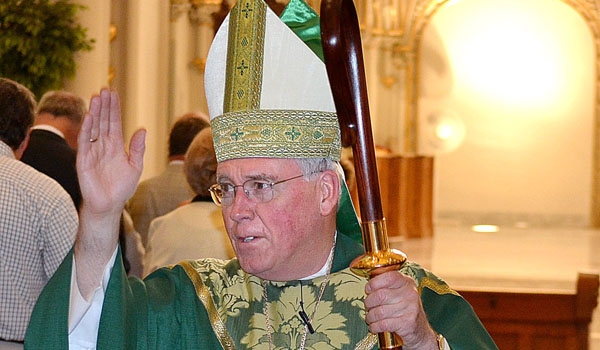Bishop Malone: Election Reflection II
by BISHOP RICHARD J. MALONE
It's a common experience for bishops. Often enough, after we have addressed some controversial moral issue (which may also be a neuralgic political issue), we get mail. This intensifies during an election season. No surprise there.
It is happening to me these days. I have on my desk right now two small stacks of mail. Stack #1: "You are too weak on defending the right to life of the unborn. You tell us we must also be concerned about the plight of refugees, racism, care of the earth, and more." Stack #2: "You are a single issue guy. All you care about is the unborn. You are obsessed with the prolife cause."
I can understand this seeming contradiction in people's perceptions of my comments...up to a point. In our U.S. Bishops' document Forming Consciences for Faithful Citizenship (FC), www.FaithfulCitizenship.org , we speak of two temptations in public life. The first is a "moral equivalence that makes no ethical distinctions between different kinds of issues involving human life and dignity. The direct and intentional destruction of human life from the moment of conception to natural death is always wrong and is not just one issue among many. It must always be opposed" (FC, #28). This is crystal clear Catholic teaching on the sacred inviolability of human life from the moment of conception to natural death.
The second temptation is the "misuse of these necessary moral distinctions as a way of dismissing or ignoring other serious threats to human life and dignity." Racism, the use of the death penalty, unjust war, torture, failure to respond to those who are suffering from hunger or lack of health care, pornography, redefining civil marriage, compromising religious liberty, environmental degradation, and unjust immigration policy are all serious moral issues - "not optional concerns which can be dismissed" (FC, #29).
As we prepare to vote in a few days in the most polarized, chaotic and alarming election season I have ever witnessed, it is critically important to heed the guidance of the bishops who are the Church's chief teachers of the faith. The following paragraph from Faithful Citizenship accurately reflects official Catholic teaching (not just my own "opinion" as an individual bishop):
A Catholic cannot vote for a candidate who favors a policy promoting an intrinsically evil act, such as abortion, euthanasia, assisted suicide, deliberately subjecting workers or the poor to subhuman living conditions, redefining marriage in ways that violate its essential meaning, or racist behavior, if the voter's intent is to support that position... At the same time, a voter should not use a candidate's opposition to an intrinsic evil to justify indifference or inattentiveness to other important moral issues involving human life and dignity (FC, #34).
The words of St. John Paul II embolden us to remain true to the fundamental teachings of the Church: "Above all, the common outcry, which is justly made on behalf of human rights—for example, the right to health, to home, to work, to family, to culture—is false and illusory if the right to life, the most basic and fundamental right and the condition for all other personal rights, is not defended with maximum determination" (Christifideles Laici, no. 38).
In many ways, it all comes down to one question: As I prepare to vote, how well formed is my conscience in the principles of Sacred Scripture and the Church's teachings as these relate to and illuminate candidates' positions and their "commitments, character, integrity and ability to influence a given issue?" (FC, #37). In the end, this is a decision to be made by each Catholic, who is guided by a conscience formed by Catholic moral teaching.
Conscience is the key. If it has been properly formed, it must be trusted and prayerfully followed. As Pope Francis noted in his apostolic exhortation Amoris Laetitia, "we (the Church) have been called to form consciences, not to replace them" (Amoris Laetitia, #37).
At a recent discussion with very committed laity, I sensed real frustration from a few folks because I cannot and will not promote one presidential candidate over the other. "Can't you see what's at stake? Don't you realize the next president will choose nominees for the Supreme Court, which will make critical decisions impacting both national policies and individual lives for years to come?"
Of course I see and realize those concerns. I share them!
I will tell you only one thing, repeating what I have said before: my conscience has never allowed me to vote for a pro-choice candidate. If you have done the hard work of forming your conscience in preparation for this election, now is the time to pray. Please join me in praying for our beloved nation and our fellow citizens as we get ready to vote. In the words of the USCCB's prayer to God our Creator, let us pray "that with every trial withstood and every danger overcome - for the sake of our children, our grandchildren and all who come after us - this great land will always be 'one nation, under God, indivisible, with liberty and justice for all.'" May God bless America!




